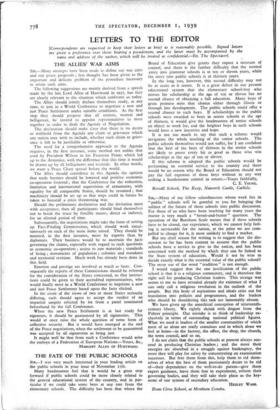THE FATE OF THE PUBLIC SCHOOLS
was very much interested in your leading article on the public schools in your issue of November 17th.
Many headmasters feel that it would be a great step forward if public schools could be more closely related to the general educational system of the. country, and in par- ticular if we could take some boys at any rate from the elementary schools. The difficulty has been that where the Board of Education give grants they expect a measure of control, and there is the further difficulty that the normal entry into grammar schools is at ten or eleven years, while the entry into public schools is at thirteen years.
In the long run, however, this second difficulty may not be as acute as it seems. It is a great defect in our present educational system that the elementary school-boy who misses his scholarship at the age of ten or eleven has no second chance of obtaining a full education. Many boys of great promise miss that chance either through illness or through late development. The public schools could offer a second chance to such boys. If scholarships to the public schools were awarded to boys in senior schools at the age of thirteen, it would give the headmasters of senior schools an object to work for, and the brighter boys in such schools would have a new incentive and hope.
It is not too much to say that such a scheme would invigorate the whole teaching of the senior schools. The public schools themselves would not suffer, for I am confident that the best of the boys of thirteen in the senior schools are likely to prove every bit as good as those who win scholarships at the age of ten or eleven.
If this scheme is adopted the public schools would be performing an essential service to the country and there would be no reason why the Board of Education should not pay the full expenses of these boys without in any way seeking a burdensome control in return.—Yours faithfully, C. E. YOUNG.
Rossall School, The Keep, Naworth Castle, Carlisle.
SIR,—Many of my fellow schoolmasters whose work lies in " public " schools will be grateful to you for bringing the subject of the future of those schools into public discussion. For those of us who have been teaching for many years the matter is very much a " bread-and-butter " question. The operation of the Burnham Scale means that if these schools have to be closed, our experience, which we cannot help feel- ing is serviceable for the nation, at the price we are com- pelled to charge for it, is most unlikely to find a market.
But my chief reason for writing is to suggest that the dis- cussion so far has been content to assume that the public schools have a service to give to the nation, and has been concerned with the method by which they can be linked to the State system of education. Would it not be wise to decide exactly what is the essential value of the public school? The mere use of the word " tradition " is not enough.
I would suggest that the one justification of the public school is that it is a religious community, and is therefore the right soil for producing Christian leaders. This strange war seems to me to have revealed already the existence of what I can only call a religious revolution in the outlook of the people. But this body of aspirations and ideals cries out for translation into policies and programmes, and the leaders who should be shouldering this task are lamentably absent.
We have given up the anarchical conception of nineteenth- century• liberty. We rightly shrink with disgust from the Fiihrer principle. Our mistake is to think of leadership ex- clusively in terms of outstanding national political figures. What we need is leaders of the smaller communities of which most of us alone are really conscious and in which alone we feel at home—in the factory, the office, the shop, the church, the town council, and so on.
I do not claim that the public schools at present always suc- ceed in producing Christian leaders ; and the more their energies are absorbed in a struggle against bankruptcy, the more they will play for safety by concentrating on examination successes. But free them from this, help them to rid them- selves of what the best of them passionately desire to be rid of—their dependence on the well-to-do parent—give them expert guidance, leave them free to experiment, reform their governing bodies, and they will take their place as the key- stone of our system of secondary education.
HEDLEY WARR.
Dean Close School, at Monkton Combe.












































 Previous page
Previous page